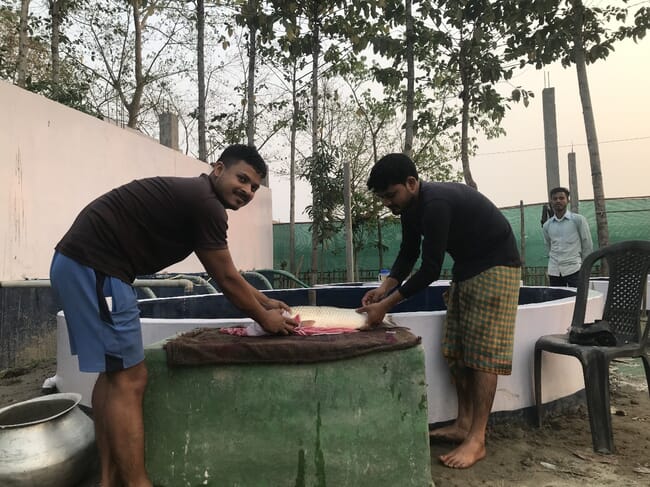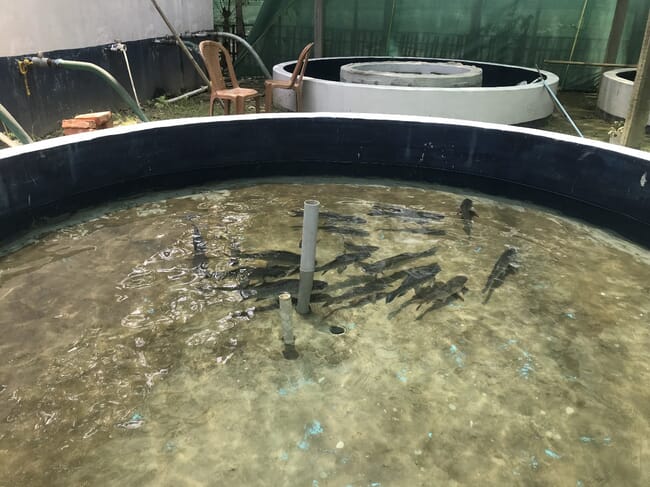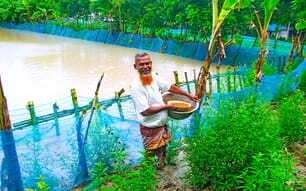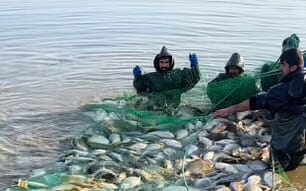
© Gurvinder Singh
What inspired you to embark on a career in aquaculture?
My father was a fish farmer and owned two ponds spread across 0.9 hectares the village of Dihina in the Kamrup district of Assam. The income was not enough and we could barely afford enough to eat.
I always felt that the fish farming had lot of potential if done properly, and so I started fish farming after finishing my education in 2015.
Did you take any formal training in fish farming?
I had some knowledge about the farming as I had seen my father doing it since childhood days. I also took a training from the officials of the state fisheries department.
What is the size of your farm and what species do you produce?
In total my farm consists of six ponds spread across 9 acres. I also have seven tanks: six hatchery tanks and one for hapas - small cage like enclosures.
I cultivate Indian major carp (IMC) like rohu (Labeo rohita), catla, silver carp and grass carp.
What is your total production and how do you procure your feed and seed?
I produce around 170 litres of spawn and roughly 2000 kg of fingerlings annually. I also sell broodstock. I earn around Rs 15 lakhs ($17,964) per year from fish farming and also provide employment for six other people.

© Gurvinder Singh
What challenges have you face with your farm?
I would rather not call them challenges as each mistake or failure is a new learning in this profession. I don’t stop at challenges but look for solutions and move ahead. I really believe all the fish farmers should also practice this habit.
What is your typical day at work?
I wake up around 4.30 in the morning and go straight to the farm to feed the fish. I stay in the farm for nearly 2 hours and then meet the buyers who come to buy my fish. During the breeding season, normally from February to July, I have to stay awake whole night to check the oxygen, water level, and other parameters.
What is your biggest worry at work?
We are surrounded by rivers, and floods are major issue in Assam every year. We have a strong embankment near our village that prevents water from entering into our ponds, but we don’t know what the future holds. The floods could destroy our whole crop if the severity is high.

© Gurvinder Singh
Has your farm faced any financial losses?
Yes, I faced major losses twice in the same year. The vehicle carrying around 400 litres of spawn was hit by a landslide on its way to neighbouring state of Arunachal Pradesh. Due to this accident I suffered a loss of around Rs 10 lakhs ($11,976) in 2021. The other incident also happened in the same year when 300 litres spawn when the driver carrying the fish suffered a vehicle accident.
Are there any individuals or organisations who have supported your career?
Yes, I am thankful to Ranjit Sarma, the fisheries development officer for Kamrup district whom I met in 2014 and who motivated me to start fish farming. I am also thankful to Dr Pratul Barman, another district fisheries development officer in Kamrup for giving me technical guidance on fish farming.
What are your ambitions for your work?
I want to grow more and expand my business further. I want to supply fish in several states of the country.
What is your advice for young people considering a career in aquaculture?
Fish farming has tremendous scope and the income is four times the investment, which few other businesses can offer. It just needs hard work. Our youth are rushing for jobs without realising the potential of fish farming. I would like to urge young people to opt for aquaculture and earn good money. It makes us self-reliant, and becoming an entrepreneur is a matter of joy and happiness.








